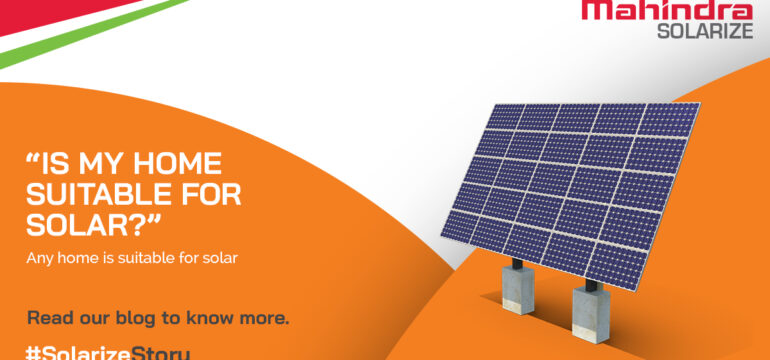One of the biggest conundrums faced by a first time solar owner is: is my house suitable for solar? Many questions regarding cost effectiveness, rooftop suitability, generation of electricity etc. pop up which can create confusion if not addressed.
Contrary to popular belief, solar panels make a sound investment for most types of houses in India. Rooftop solar for home is a lucrative opportunity to generate electricity in a sustainable and renewable manner.
Solar panels are made of photovoltaic cells (PV) which are designed to capture light rather than heat. All you need is plenty of natural sunlight for the solar arrays to capture, harness, and convert into electricity that can power your house for months.
Before you commit to harnessing solar energy at home, it is necessary to go through a thorough checklist to ensure that your house and solar panels make a suitable match. It is as follows:
- Roof size
Unlike ground-mounted large solar plants, rooftop solar panels for residential homes can be tricky to work with. The extent of roof area required by solar PV panels depends on two things:
- Shade-free roof area since factors like neighbouring buildings, telephone poles, billboards etc. can cast an overshadow, thereby affecting the performance of the panels.
- Panel efficiency is crucial since rooftop size directly influences the performance of a panel array. A simple formula to remember is that lower efficiency roof panels will require larger rooftop space as compared to a plant that uses high efficiency rated panels.
On an average, solar panels 65 x 39 inches are suitable for residential roof spaces. These panels are smaller in size (28-34 panels) compared to commercial installations but are sufficient to generate enough electricity for your home.
- Direction
The trick to achieving maximum power generation is to make the panels face south. This is because when the sun rises from the east and sets in the west, maximum sunlight exposure is received in the southward direction. This shall apply regardless of the time of the year. - Roof materials
Before installing a heavy-duty solar panel system on your roof, it is imperative to check how old is your house and what material is the roof made of. Rooftop solar for home is possible with materials like asphalt shingles, metal, and clay/concrete tiles are ideal for residential installations. - Climate
Solar energy can be generated in all kinds of weather and climates, ranging from sunny Jodhpur deserts to cloudy cities of Bangalore. This is because solar panels convert direct and indirect sunlight into energy and do not require high temperatures to function. As long as the panels get access to sunlight, it will function. - Financial requirements
Consumers can avail different financial options for financing their solar needs. You can choose to purchase a solar system since the installation cost will be lower than the installation cost for panels installed on a solar loan, lease, or power purchase agreement (PPA). Solar leases and PPAs allow consumers to host solar energy systems that are owned by solar companies and purchase back the electricity generated. Consumers enter into agreements that allow them to have lower electricity bills without monthly loan payments. Mahindra Solarize’s innovative technology solutions combined with easy EMI options for financing make it a smooth process for installing rooftop solar for homes. From choosing the right panels, installation process to post-installation maintenance, we have you covered.

